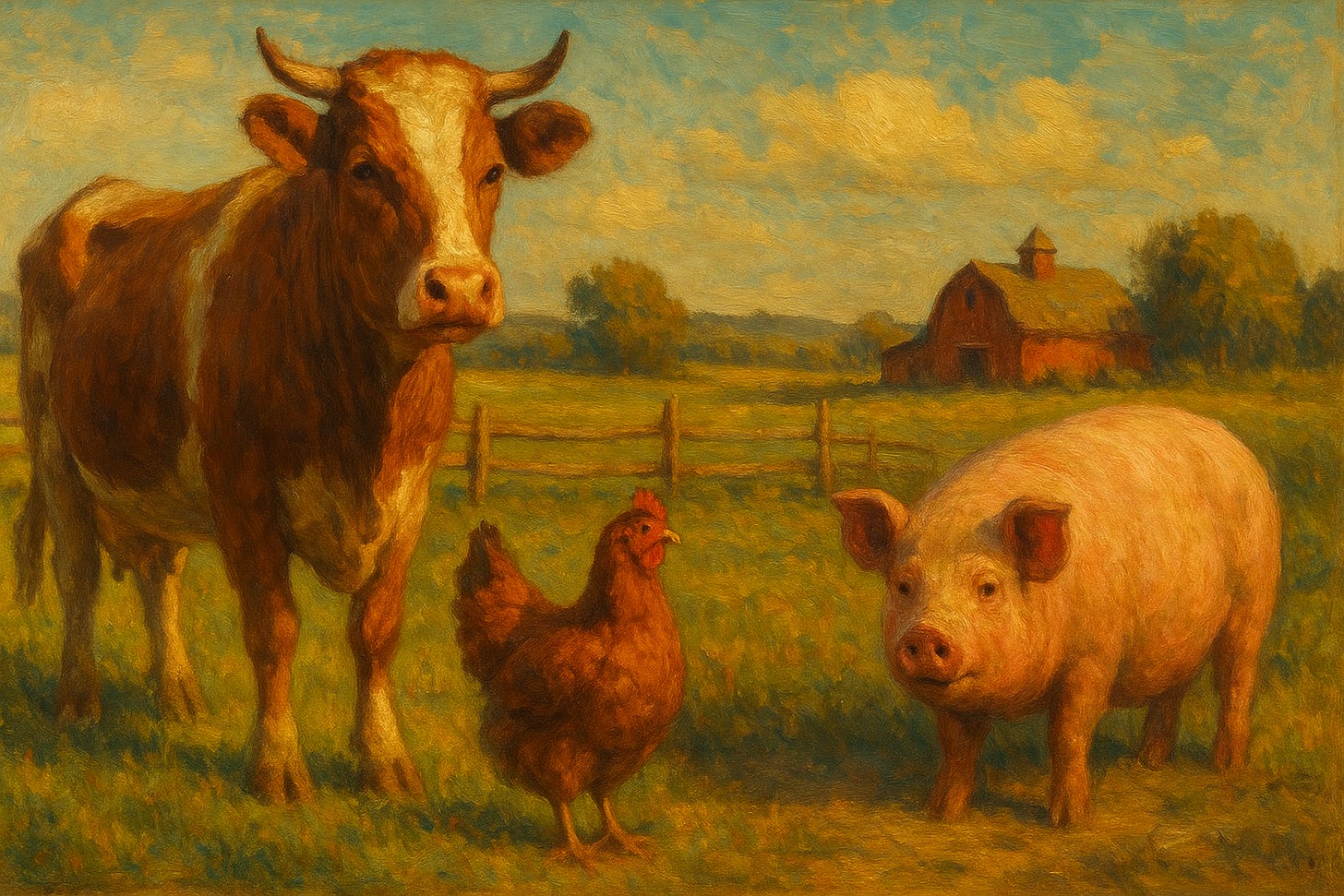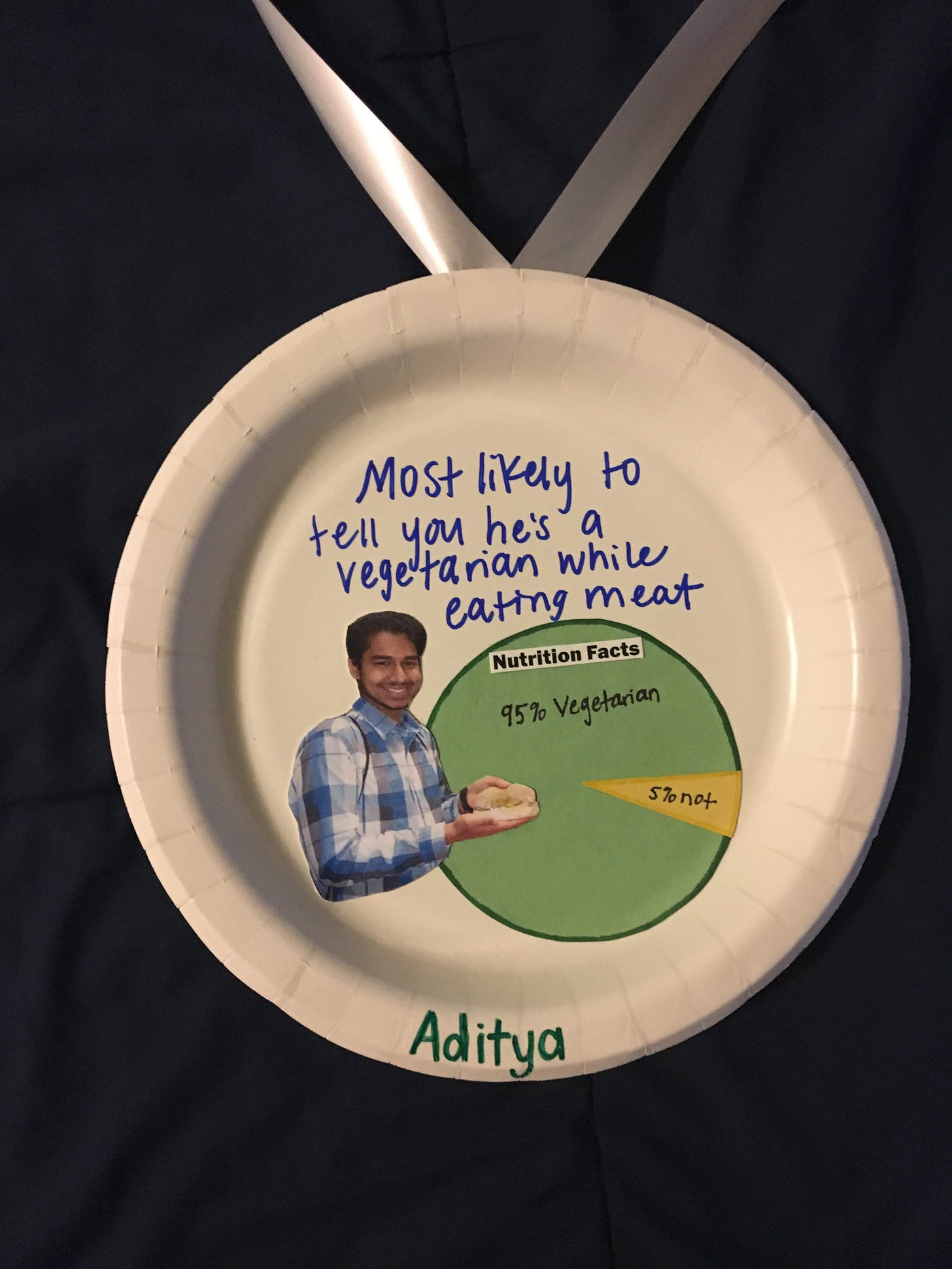Why I Try to Be Vegan
And Why You May Want to Try Too
Content warning: This piece discusses animal abuse, but does not include images of abuse.
“It’s just food,” she said calmly. Even now, sixteen years later, I remember this moment with despondency. How could anyone objectify a kind being like a cow and reduce them into today’s lunch and tomorrow’s bowel movement? How cruel must someone be to be able to do that? This is what I thought as my middle school violin teacher told me this.
However, as time has passed, I realized how one need not be so cruel to commodify our animal friends into a Taco Bell Crunchwrap Supreme. I would know as I’ve done it many times myself. Despite being raised a vegetarian, my diet fluctuated a lot after starting college.
I went from being vegetarian, to flexitarian1, to vegan, to an omnivore, to the carnivore diet2, then to being an omnivore again, then vegetarian again, and now being vegan again.
As you can see, it’s been a circuitous path. While I could go into further detail about what motivated each twist and turn, my vacillation can be summed up like so: I believed that my wants outweighed the needs of other beings. While I did at times use health to justify my consumption of Zoogen3 (i.e., animal derived products such as meat, milk, eggs, etc.), I subconsciously held the belief that “my taste buds were more valuable than their lives.”4
I believed that my wants outweighed the needs of other beings.
To clarify, I’m not trying to shame myself. I’m trying to show that my violin teacher and I are not so different. Indeed, it’s human nature to put one’s wants above others’ needs. Whether we’re talking about diet or other areas of life, we all do this to varying degrees. And so when we are faced with this unskillful quality, what should we do? I think we should aspire towards the golden rule: treat others (including animals) the way you want to be treated.
So what exactly does veganism mean? Merriam-Webster defines the term vegan as “a strict vegetarian who consumes no food (such as meat, eggs, or dairy products) that come from animals.”5 While this is a fitting definition, I feel that it does not capture the “why” behind veganism. For me, veganism is fundamentally about living a life that minimizes harm caused to others. Diet is of course the main way this is exemplified, but to be frank I consider purchasing fair trade6 goods an extension of my veganism. For me, being vegan means always asking oneself, “How can I further reduce suffering?” So why should one become vegan in the dietary sense?
Treat others (including animals) the way you want to be treated.
Why Go Vegan?
For Animals
We should become vegan so we can treat our animals friends with the dignity and respect they deserve. The scientific community has reached the consensus that many animals, including farm animals like cows, chickens, and pigs, are sentient. This means they are capable of being aware of their surroundings, have subjective experiences, perceive pleasure and pain, and have a variety of emotions.7
However, did we really need scientific studies to prove this? Anyone who has a pet can attest that their animal companion has a unique personality with changing moods. However, we as a society have failed to grasp that just as our cats and dogs are complex creatures, the same applies for farm animals. If you’re skeptical, consider watching this six minute video about Harveigh:
Now imagine Harveigh having her throat “humanely” slit and carved up into a slab of meat to become a McDonald’s Big Mac. Or imagine her being forcibly impregnated with a metal rod that gets shoved up her vagina and squirts semen into her uterus. This is being done to her so her milk can later be stolen to make some mozzarella sticks. By the way, when her calf is born, she’ll be forcibly separated from her child. If the child is a girl, she’ll have the same fate as her mother. If the child is a boy, he’ll either be murdered immediately or jailed in a tiny enclosure to restrict movement and fed a diet of milk formula so his body can be used to make veal.
By the way, this forcible impregnation and child separation will happen to Harveigh once a year. After 4-6 years, Harveigh will no longer be considered an “efficient producer” of milk and so will be murdered for meat. While it may be hard to fathom the scale of this, there are an estimated 1.5 billion8 cattle globally and 300 million9 are slaughtered annually. This comes out be 10 cows murdered every second. As difficult as it may be to fathom this, every single one of these cows is full of as much joy and playfulness as Harveigh is.
As you can guess, the treatment of chickens (whether to produce eggs or meat), or pigs is about as horrendous, if not more, than the experiences of cows. I would go into detail about their stories but for the sake of brevity, I’ll simply include some resources in this footnote if you’d like to read more.10
For Humans
Whenever I used to savor the taste of some pork belly, I admittedly did feel some guilt about the being I was eating (let’s call her Peppa). However, what I failed to entirely remember was that this was only half the picture: there was a human (let’s call him Miguel), who actually committed the murder.
Miguel was the one who physically restrained Peppa, placed a bolt gun on her forehead, looked her in the eyes, pulled the trigger, and sent a piece of metal hurtling into Peppa’s skull, hopefully killing her instantly, or at least knocking her out.11
I don’t need to be a psychologist to tell you that murdering beings like Peppa with your bare hands day-in, day-out, is probably not the best way for Miguel to cultivate peace in his life. Instead, this tends to do the complete opposite. Slaughterhouse workers are far more likely than average to struggle with substance abuse and depression. They are also noted to struggle with post-traumatic stress disorder, a condition often found in combat veterans.12
As these jobs are considered socially undesirable, they often go to racial minorities, refugees, and undocumented immigrants. The big corporations running these slaughterhouses exploit their employees by providing little to no workplace protections and by denying them a living wage.13
By going vegan, we can not only save the lives of beings like Peppa, but also the minds of beings like Miguel.14
For Health
Going vegan can provide numerous health benefits, including improved heart health, lower risk of Type 2 Diabetes, improved weight management, and reduced risk of certain cancers.
The Academy of Nutrition and Dietetics (the largest organization of food and nutrition professionals in the US) has stated that “appropriately planned vegetarian, including vegan, diets are healthful, nutritionally adequate, and may provide health benefits for the prevention and treatment of certain diseases.” The British Dietetic Association, Dietitians of Canada, the Harvard T. H. Chan School of Public Health, and the UK National Health Service all concur.15
However, as mentioned above, in order for a vegan diet to be healthy it must be “appropriately planned.” This means that you need to eat a wide variety of fruits, vegetables, and whole grains to ensure you do not end up with any nutrient deficiencies. You can get all the nutrients you need to have a healthy diet from plants except for Vitamin B12. This you can easily get from a supplement or fortified foods, like plant-based milks.
Many avoid plant-based diets because they worry about nutrient deficiencies. However, we see that even omnivores have vitamin deficiencies. In the US, it’s estimated that 42% of all Americans are deficient in Vitamin D, 10% of women are deficient in iron, and 20% of people over the age of 60 are deficient in Vitamin B12.16 As shown, eating Zoogen does not guarantee that one is getting all necessary nutrients. Whether vegan or omnivore, appropriate planning is essential.
Also, if taking a supplement to get enough Vitamin B12 seems less natural to you than getting it via eating meat, then you may be disappointed to hear that farm animals mainly get Vitamin B12 through supplements too.17
For Environment
It is estimated that around 12 percent of greenhouse gas emissions come from animal agriculture. This includes emissions created from producing animal feed, managing animal manure, and energy used for transporting and processing the Zoogen. It also comes from burps and flatulence from the animals themselves in the form of methane.18
Animal agriculture is also one of the leading causes of deforestation. This not only disrupts ecosystems and destroys biological diversity, it also reduces the amount of trees that can act as carbon sinks to trap greenhouse gases.19 Despite animal agriculture using around 80% of global farmland, it only produces around 20% of all calories. By contrast, plant agriculture uses about 20% of global farmland but provides around 80% of all calories.20
The statistics are even more jarring when looking at water usage. It takes almost 2000 gallons of water to produce 1 pound of beef (this includes water the animal drinks and water used for feed crops). So a quarter-pounder with cheese at Burger King took almost 500 gallons of water to make. For context, this is about 8 full bathtubs worth of water!21
By contrast, a pound of wheat takes only around 200 gallons of water.22 Based on these numbers, plant-based foods are around 15 times more efficient in terms of land use and around 8 times more efficient in terms of water use.
As you can see, just by changing our diet, we can make huge strides towards stewarding our Earth.
What Makes Veganism So Hard?
So if there are all these reasons for why we should go vegan, why isn’t everyone vegan already? Here’s my take from a Buddhist perspective.
The Buddha taught that taṇhā (often translated as thirst, or craving) is so deeply embedded in our conditioning that we grasp for sense pleasures ceaselessly. As such, it is hard to pause and acknowledge the negative impacts our actions are having on ourselves and others. For this reason, I now believe that our habit of eating Zoogen is like an addiction.
Our habit of eating Zoogen is like an addiction.
I experienced this firsthand with my own addiction to porn. Despite knowing that constantly watching porn and masturbating was not good for me, I just couldn’t bring myself to stop. Even when confronted with horror stories of the hostile working conditions and routine violence perpetrated in the porn industry, I lacked the wisdom to take action and change my ways. It was only after much inner work through therapy, meditation, and support groups that I was finally able to find some sobriety.
Similarly, when so many choose to continue consuming Zoogen despite knowing the horrors of factory farming, it seems only logical to me that just as I struggle with porn addiction, others are struggling with Zoogen addiction. And to clarify, I am not exempt; I too am a Zoogen addict. Despite my best efforts, I do occasionally relapse and eat Zoogen. My mouth even waters when I think back to times when I would eat it regularly.
For many months in 2023, every Saturday morning after hot yoga, I would stop by Whole Foods and pick up some salmon sushi and coconut water to have a sumptuous feast. That first taste of sushi that had been dipped in soy sauce with a dash of wasabi was nothing short of divine. And don’t even get me started on all the irresistible burritos and sauces (like Diablo!) I miss from Taco Bell. I’ll never forget you, my dear 7-layer burrito 😭.
And this is what I’m really getting at. When we really look at our relationship with our favorite foods, this element of craving is not flavored with choice; but rather compulsion. And so each of us needs to look ourselves in the mirror and ask: do we want to lead lives based on compulsion or kindness?
This element of craving is not flavored with choice; but rather compulsion.
Go Vegan!
Thank you for reading this far. If you’d like to give plant-based diets a try, then read on.
As with all habit change, it’s important to start small. Is there one meal a week where you usually eat Zoogen that can be swapped with something plant-based? If you currently eat lots of Zoogen, it may be more feasible to be a vegetarian first before trying veganism.
But regardless of how you go about, I encourage you to be gentle with yourself. I have often found myself in the following situation:
I watch a disturbing video of animals being abused on a factory farm.
I am filled with strong resolve to go 100% vegan right away.
I manage to stick to this resolve until I find myself at an event with free (not vegan) pizza.
I cave and stuff myself with pizza.
I feel ashamed and decide to give up on veganism.
After relapsing several times like this, I’ve come to see the importance of slogans I have learned from my Twelve Step Fellowship23: “Progress not Perfection” and “One Day at a Time.” The reality is that while I can’t guarantee I’ll never eat Zoogen again, what I can guarantee is that I’ll keep doing my best. And the truth is that the world will be a much better place even if we’re all just imperfect, 95% vegans.
If you’re looking for more specific info on how to go plant-based, here are some helpful resources!
The Vegan Society | How to Go Vegan
Parkview Health | Transitioning to a Plant-based Diet - Tips and Tricks
UCLA Health | Transition to Vegan Diets Should be Gradual
If I can be of any support, feel free to contact me through Substack (comment, direct message) or through my website! You’re also welcome to book a free call24 with me here if you’d like to chat. I wish you all the best 😊.
This means that I had a primarily vegetarian diet with occasional consumption of meat.
This means I ate only meat for a time (though I struggled to cut out bread).
As there is currently no one term that can be used to refer to all animal-derived products (like meat, dairy, eggs, leather, etc.), I decided to invent one. “Zoo” being the Greek root meaning animal and “gen” being the Greek root that means derived from. As such, Zoogen means products derived from animals. It is pronounced similar to pathogen or carcinogen.
If a product is certified as “fair trade”, then this means that it was produced in a manner where workers had safe working conditions and were paid something closer to a livable wage.
D'Silva, J., Dalton, H., Boyland, N.K., & Turner, J. (2024) - "Animal sentience: The science and its implications, with particular reference to farmed animals." Link to article here.
Consider reading these pieces from the American Society for the Prevention of Cruelty to Animals and the Animal Welfare Institute.
However, I should note there are many reported instances of the bolt gun being used improperly and pigs still maintaining consciousness for the next steps, like having their throats slit, being hung upside down to bleed out, and being thrown into boiling water to have their body hairs fall off.
Slade, J., & Alleyne, E. (2023). "The Psychological Impact of Slaughterhouse Employment: A Systematic Literature Review." Trauma, Violence & Abuse. Link to article here.
If you’d like to directly hear the stories of ex-slaughterhouse workers, I recommend this video here.
Here are the links to each of the organizations’ positions: The Academy of Nutrition and Dietetics, The British Dietetic Association, Dietitians of Canada, the Harvard T. H. Chan School of Public Health, and the UK National Health Service.
Here are the links with more details regarding each deficiency: Vitamin D, Iron, and Vitamin B12.
A 12 step fellowship is a support group where addicts help one another manage their addiction. Some examples of support groups include alcoholics anonymous, narcotics anonymous, sex addicts anonymous, etc.
I also offer meditation instruction on a donation basis, which you can learn more about here: https://adityaaswani.com/learn-meditation/.




